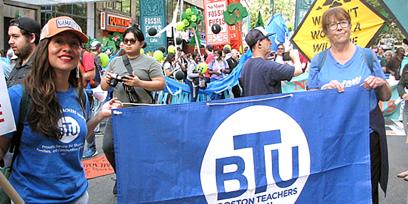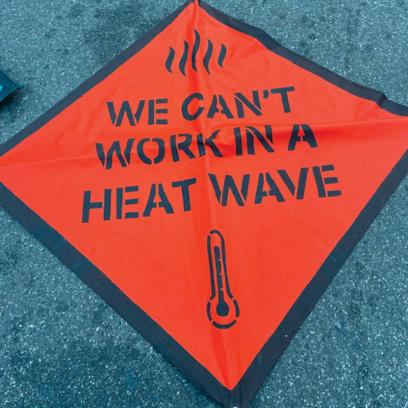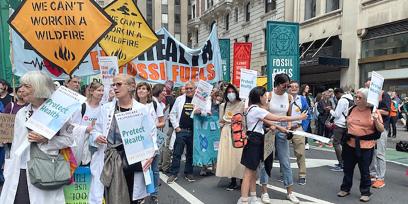The Boston Teachers Union (BTU) Climate Justice Committee is a small but powerful group of educators fighting for a just transition to a green economy and striving to help themselves, their students, and their communities reverse the climate emergency. We sat down with four current and former Boston teachers—Mira Brown, Betsy Drinan, Jack Elliott-Higgins, and Irischa Valentin—to learn how they became climate activists and why they find their union to be an effective vehicle for pursuing their passion.
–EDITORS
EDITORS: Tell us about your careers and what drew you to fighting for climate justice.
IRISCHA VALENTIN: I am a product of the Boston Public Schools, have been teaching in Boston for 19 years, and am a proud union member. My passion for teaching climate justice is rooted in my close ties to my ancestral lands in Puerto Rico. Experiencing life there with my grandparents stirred up my love for the earth and gardening. Since I was very young, I’ve been enamored with plants, especially herbs and trees, and with growing plants. Today, I’m a community herbalist in addition to teaching third- and fourth-grade English as a second language and sheltered English immersion.
Most of my students are Spanish speakers, mainly from the Dominican Republic and Central and South America. I say that because so many of those students also have an affinity for nature and a beautiful connection to gardening—and they love our community garden. They’re so excited to get their hands in the soil and talk about their gardens back home that they’ve cared for with their grandparents and parents.
Tending a garden is a very hands-on way to teach children to love the earth, or to build on the connection to the earth that they bring to the classroom. Especially in the elementary grades, teaching them the magic of growing a little seed into a bean plant also shows them the responsibility we have to take care of each other. I encourage self-sustainability, even if their family can only grow a little oregano on their windowsill. It creates a deeper connection to themselves, to each other, to their families, and to the earth.
JACK ELLIOTT-HIGGINS: This is my fourth year teaching. I teach chemistry and biology at Boston Green Academy, which is an in-district charter school for grades 7–12. I went to college for biomedical engineering and computer science. While there, I got involved in a lot of activism and organizing around climate justice and other issues. Eventually, I teased out that I wanted to be a teacher because you can imbue so much passion into your craft around the issues that you care about.
Boston is getting hit by the climate crisis already. Our students notice it, and they want to have the language to talk about it. They want to talk about solutions, including what climate justice looks like. I think we educators don’t always have the same idea as students do of what justice looks like, but we can still coalesce and create a committee to start tackling it. That’s why I’ve gotten involved. By starting at the local union level where educators can talk about what we need in terms of infrastructure and curricula, we can make an impact in the city around this really critical issue.
BETSY DRINAN: I retired three years ago, having started teaching in the 1970s. I worked in alternative education initially, then became a Boston public school teacher in the 1990s. I was a founding lead teacher of the BTU School in 2009, and in 2017 I was elected as BTU’s secretary-treasurer.
I knew I wanted to devote time to climate justice in my retirement. I was there at the first Earth Day in 1970! The more I learn, the more terrifying this problem is, honestly. Policymakers globally are not keyed into it like they need to be. But my union is—and it’s a great power base for this work. The BTU is a respected organization that represents a lot of people.
Teachers and students across the city are thinking about climate justice, and there are many issues we could take the lead on to ensure we have healthy, safe schools. These discussions came to the forefront during COVID-19 because of concerns about our school buildings, particularly their HVAC systems.
MIRA BROWN: I became a public school teacher in my late 40s, teaching middle and high school science, including a semester-long course on climate change that my colleagues and I developed as part of a senior capstone class that applied chemistry, physics, and biology content and science skills to social justice issues. I’ve been a climate activist since the 1970s, and my undergraduate degree is in small-scale renewable energy technologies. While working on renewable energy in Nicaragua, I saw how small-scale projects could increase local autonomy and spur social change. When I returned to the United States, I worked for a nonprofit doing youth and community development using recycled bicycles as a source of seed funding for employment generation projects (and to support sustainable transportation!). Eventually, I became a classroom teacher because I believe we need more science education and fact-based decision-making in today’s world. Currently I’m a paraprofessional, because as a teacher I never got my workweek down to less than 70 hours. I’m glad to have time now to devote to climate justice work.
EDITORS: What does the BTU Climate Justice Committee do? And why are you focused on climate justice instead of climate change?
JACK: In my experience, climate change is mainly taught as an abstract thing—numbers and trends. Climate justice makes an important distinction by focusing on how climate change is impacting communities, especially communities of color and low-income communities here and abroad. Climate justice seeks not only to stop climate change but also to rectify these inequities.
Instead of approaching it in an abstract way, we can teach climate justice by examining what’s happening in Boston. For example, Dorchester, a diverse neighborhood in Boston, has some of the lowest tree cover, hottest summer temperatures, and greatest flooding risk along the shore. That impacts students from Dorchester on a daily basis—and empowers all of our students to become activists for climate justice.
BETSY: One of the first things we’ve decided to address as a committee is what students in Boston public schools are learning about climate change and its disparate impacts. District staff gave us a thorough presentation of climate content for K–12. Upon reflection, we agreed that it is solid but it could go a lot further and deeper.
JACK: In February and March of 2024, we developed a contract proposal to implement climate justice curriculum across Boston public schools. Our goal is to create a working committee, 75 percent BTU members and 25 percent appointed by the district, to work through what it means to have a climate justice curriculum, how to make it interdisciplinary, and how to implement it across grade levels and across classes. So often, climate lessons are relegated to a science classroom, but climate justice isn’t just about science. We’re talking about not only climate change but also the ways it impacts people’s lives. There are so many ways to integrate it throughout the curriculum. We’re hopeful that we can create a model curriculum for the rest of the country to implement.
BETSY: Educators are always getting curriculums thrown at us that are yet another thing to do. Our idea instead is to find those moments in the current curriculum where we can infuse climate issues. It won’t be an add-on that no one has time for; it’ll be an enhancement to what’s already being taught.
MIRA: Inspiration for this contract proposal came from the Somerville Educators Union. They asked for and won a climate curriculum committee in their contract negotiations last year, with union members being paid for the hours they work with the committee. And the superintendent they had at the time has since become our superintendent.
BETSY: We have to help young people feel engaged and develop advocacy skills, so learning about climate is not all doom and gloom. We’re not waiting for the curriculum to be revised to do this; the BTU recently funded professional development on climate justice that we opened up to the whole state by working with AFT Massachusetts. The PD was well attended and very favorably received, and it began to help us build our distribution list of people who are interested in these issues.
Another priority for our Climate Justice Committee has been getting a seat at the table for the mayor’s Green New Deal for Boston Public Schools. The mayor is deploying electric buses and has appointed a Green New Deal coordinator and a climate chief; recently the city made a commitment that any new public building or any major retrofit in Boston will be built to carbon-neutral specifications. The city is mandated by the state to have a 10-year master facilities plan. Currently, the city has assessments of the building structures and systems (like HVAC), but it has not provided the specifics of how schools will be renovated. We’re eager to help make those decisions.
MIRA: Educator voice in the renovations decision-making is important because educators, school staff, and community members have real expertise to offer about what’s happening in our buildings and about how to improve them. When I worked in Central America, I saw the benefits of recognizing the other types of expertise in people such as teachers, students, paraprofessionals, custodians, and cafeteria workers who may not have technical expertise in green construction but really know their communities and how their daily activities interact with the spaces around them.
We need to establish a systematic way to get that expertise recognized and included in the green schools planning process—something more inclusive than the usual community meetings that only some people have the time, flexibility, and resources to attend.
As we move forward into a society where we do a much better job of taking care of each other, organizing workers is a really important way to make sure that workers are listened to and that our expertise is acknowledged and used to benefit everybody. I care about workers being well paid, but I also care about using the wisdom of working people in the plans for how we’re going to deal with crises in society. And I think that unions need to be playing an increasing role in shaping changes as we face the decades ahead.
I’ll share one more detail about how our committee built its contact list and initially recruited some of our current members. I helped form an earlier iteration of the BTU Climate Justice Committee in the 2014–15 school year, and we were recruited by a statewide organization to support legislation divesting the state pension fund from the fossil fuel industry. Through house parties that we hosted in BTU members’ backyards with wine and cheese, we found members at 10–15 different schools to take petitions back to their staff rooms and collect signatures in support of the legislation. The bill did not pass, but the contact information from those petitions gave us the beginning of the email list we use today—and helped us reach some of the members who helped restart the committee two years ago.
EDITORS: There are many environmental groups you could devote time to. Why do you choose to focus on your union’s Climate Justice Committee?
BETSY: The Boston Teachers Union and AFT Massachusetts are significant forces. In my retirement, I’ve learned the local landscape of climate groups—some of them are small. When we put an announcement in BTU’s weekly e-bulletin, about 14,000 people receive it. That gives us the potential to have a real impact. And there’s a certain gravitas when I go to a meeting and say, “I’m on the BTU Climate Justice Committee.”
I also represent the BTU on Climate Jobs Massachusetts, which is a coalition of unions and partners advocating for good green jobs and for a just transition* to a green economy. That’s an even bigger, statewide platform. Growing out of the 2022 AFT convention in Boston, I have been working with other AFT climate activists from across the country. We have created the AFT climate and environmental justice caucus, and we work to more firmly center climate justice within the AFT’s priorities. One benefit of retirement is having time to give to each of these groups.
JACK: I’m fairly involved all around in the union. I’m a building rep, have been on the Contract Bargaining Committee this year, and have been doing a member organizers program. To me, the Climate Justice Committee is a synthesis of my teaching work and my union work. It provides a valuable opportunity to synthesize those two things, like the activism of being a union organizer and the everyday reality of being a science teacher: What am I teaching and how does it impact my students?
We talk so much as educators, and you hear it from administrators, about the importance of student-centered curricula. To me, this work is one of the best examples of student-centered curricula. This impacts students on a daily basis. It’s going to impact them more and more as their lives go on. They care about it, they’re interested in it, they want to fix it. Being part of this committee is how I can make a difference for my students and also for myself in terms of what resources I have to teach this content effectively—not having to develop them on the fly on my own.
I think everybody has to make their own choices around where their efforts are best spent. Teachers are incredibly busy all the time, but to me it makes the most sense and I feel like I’m the most effective within the union because that’s where I spend so much of my time as it is. It’s where I’ve developed many relationships, and it’s what impacts my job directly.
IRISCHA: I do what I can: recycle, compost, grow my own food (as much as I can in the Northeast), and I teach my family, my students, and my community. I think the climate crisis demands all levels of engagement. Through my union, there is a higher level of advocacy, of amplification, on climate justice.
This is life and death now. Climate justice is very intersectional and is impacting marginalized people. I think of our future generations, and I feel compelled to do all the things I can right now. And so I’m here, giving my time to this committee.
MIRA: I agree with what my colleagues have said, so I’ll just add one point. When construction starts to make our schools greener, there’s an exciting opportunity for union solidarity. We’ll fight for union construction jobs. Over time, fights like that help increase unionization and interest in a just transition in the construction sector.
EDITORS: What do you wish you had known when you were starting down this path?
BETSY: Don’t get discouraged. Sometimes you feel like, “I’ve been pounding at these same things and we’re not making progress.” Then all of a sudden, something happens. For example, we’ve been trying for quite a while to figure out how to get our state retirement funds out of fossil fuels. This spring, I learned of a potential lawsuit that might accomplish our goal.
I’ve learned to just keep learning, reaching out, going to meetings, raising my concerns, and trying to think strategically about how to have the greatest impact. Over time, connections get made and you’re able to make some progress.
MIRA: As teachers, we get accustomed to feeling isolated in our classrooms. There is value in attending meetings on issues you care about just to counteract that isolation. Also, the people you meet and the connections you make help prevent feeling discouraged.
BETSY: You don’t know when those moments of connection are going to happen, but they certainly won’t happen if you’re not there.
IRISCHA: When you’re a new teacher, you’re trying to figure out, “What is this whole teaching thing I got myself into?” I didn’t get involved in my union until about 10 years ago. Now, as a building representative, I’m wondering if I’m doing enough to engage members so they get involved.
MIRA: I didn’t go to a membership meeting until there was a contract vote. Then I realized how powerful union solidarity is. I wish I had started going to union meetings earlier.
BETSY: Exactly! Definitely go to membership meetings, and then you’ll see plenty of opportunities to get involved.
*For details on what a just transition would look like, see “Climate Justice for All” in the Spring 2024 issue of American Educator: aft.org/ae/spring2024/vachon. (return to article)
[photos: Courtesy of Betsy Drinan]



